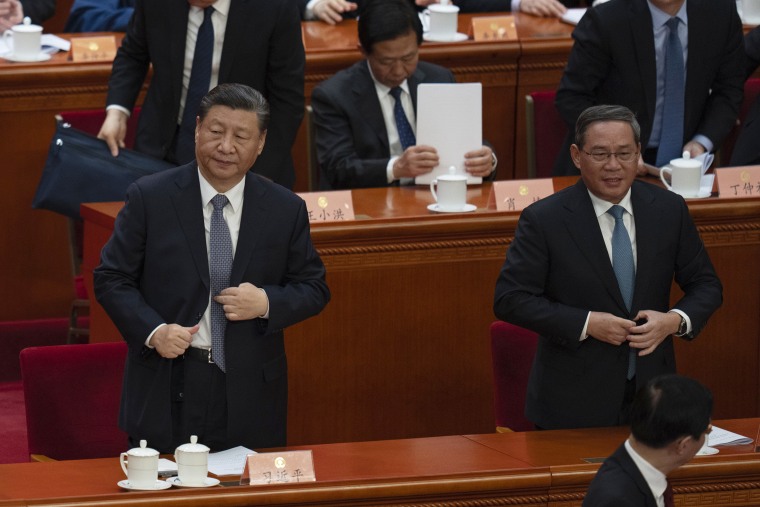China National People’s Congress: Premier’s news conference scrapped
BEIJING — China delivered a surprise on the eve of its big annual political event, scrapping a longstanding tradition in a move that may do little to ease global concerns about the fate of the world’s second-largest economy.
Beijing said Monday that the country’s premier would not be holding a news conference at the close of the National People’s Congress (NPC), eliminating a rare opportunity for journalists from around the world to ask questions of a top Chinese leader at a time of economic uncertainty at home and rising tensions with the United States and others.
Though largely ceremonial, the annual meeting of China’s legislature is the country’s biggest political event of the year. For the past 30 years, it has ended with a wide-ranging news conference by the premier, China’s No. 2 official after President Xi Jinping.
But this year, Premier Li Qiang will not be taking questions, the spokesperson for the legislature said on the eve of the meeting, which runs until March 11.
“Barring any special circumstances, this arrangement will continue for the remainder of this term of the NPC,” the spokesperson, Lou Qinjian, said at a news conference in Beijing. He did not explain further but said there would be more briefings by other government ministers instead on diplomacy, the economy and people’s livelihoods.
The current legislative term is expected to last until 2027.
Projecting confidence in China’s economy, the world’s second-largest after the United States, is a key objective for Chinese officials as the meeting of almost 3,000 delegates from across the country opens Tuesday.
“Overall, China has more favorable conditions than challenges in its economic development,” Lou, the NPC spokesperson, said Monday. “The underlying trend of a rebound in the economy and long-term growth remains unchanged. We have ample confidence on that.”
As is customary, the legislative session will begin with Li presenting the government work report, which is expected to include this year’s target for economic growth.
But the scrapping of his news conference could amplify fears among investors who are already concerned about China’s economic slowdown, particularly since the premier is nominally in charge of the economy. It may also be a hint of Xi’s increasing monopoly on power over the country’s sprawling bureaucracy.
It’s “a pity and a missed opportunity for policy communication,” Bert Hofman, an adjunct professor at the National University of Singapore’s East Asian Institute, said in a post on X.
News conferences by past Chinese premiers “were often very meaningful, and helped improve the understanding of China’s policies,” he added.
On Monday, Xi, Li and other Chinese government officials attended the opening session of the Chinese People’s Political Consultative Conference, an advisory body that meets concurrently with the NPC in the ornate Great Hall of the People to the west of Tiananmen Square.
The legislative session is being closely watched at home and abroad for signs of what the government will do to strengthen China’s economy, which grew 5.2% last year. That compares with 4.6% for this year that the International Monetary Fund forecast in January.
China faces a number of economic challenges, including a real estate crisis, deflation, unemployment, stock market volatility and a decline in exports amid geopolitical tensions.
Foreign direct investment is another concern after it fell 8% last year in its first decline since 2012, according to data from the commerce ministry. Companies doing business in China have expressed worries about tightening access to information and an expanded anti-espionage law.
The State Council, China’s cabinet, said last month that authorities “should make stabilizing foreign investment an important focus of this year’s economic work.”

Economists say China is in a new stage of development after decades of breakneck growth.
Since 1990, the Chinese economy has grown an average of more than 9% a year, according to the China Power Project at the Center for Strategic and International Studies in Washington. In recent years its growth rates have slowed, though they are still higher than many other countries.
That has created uncertainty for consumers, who are pulling back accordingly. Shopping malls and restaurants are trying to adjust to “the new normal” by offering lower-priced products and services, said Heiwai Tang, an economics professor at the University of Hong Kong.
“People don’t go to luxurious restaurants as often to eat very expensive meals or drink a lot of expensive alcohol, but they will still go to…
Read More: China National People’s Congress: Premier’s news conference scrapped

